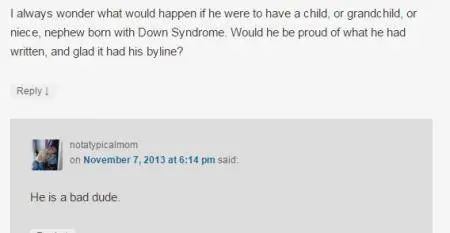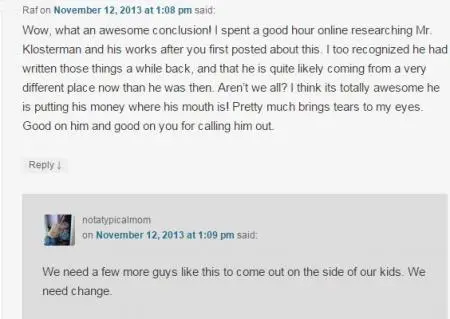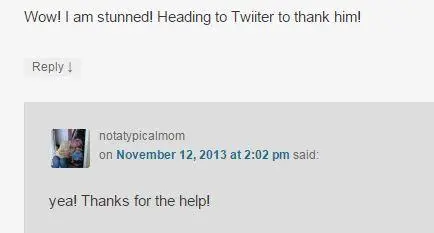A lot of writers have the same nightmare.
You wake up one morning, and the notification numbers on your Twitter and Facebook are huge. You follow the stream to find out what happened.
You start seeing that you screwed up.
You posted something somewhere that was interpreted as insensitive, racist, wrong, bad, no-no, uh-uh.
And now the internet, which might as well be the world, is abuzz with the revelation that you’re a piece of shit.
You watch your chosen career, maybe chosen art form, crumble away. You watch the possibilities for your life narrow.
Calm down a second. Let’s talk realistically.
There’s no silver bullet when it comes to managing a social media screw-up. If the Buzzfeeds of the world decide to take you on as a cause, you might be out of luck. If Slate is willing to take down an awareness campaign for prostate cancer in order to get clicks, you don’t stand much chance. If HuffPo writes a column to point out that someone is not racist in one way because he’s REALLY being racist in a DIFFERENT way, I don’t know that there's a lot you can do.
But even if you can't fix it, you can handle it. You can decide what kind of person to be post-screw-up. You can make a plan.
I’m not the field’s foremost expert. But I’ve followed a lot of stories and done some reading, and here’s what I think you could do to get through your social media snafu.
Quick Assumption: You are not, in fact, a piece of shit. Maybe you said something shitty, maybe someone dug up something you said years ago that you wouldn’t say today. But I’m assuming that you are not, deep down, a total piece of shit. I’m assuming you’re a good person who people like and think of as a good person. And I’m assuming all this because that's the kind of person I'm writing this for.
Don’t jump in right away
This is counter to what a lot of self-proclaimed social media strategists will tell you. You can listen to them or you can listen to me. I'd just add the caveat that I don't stand to make a living from your decision. A social media strategist does.
Let's look at it this way. Famous game designer Shigeru Miyamoto, when it came to blowing deadlines, said that everyone will remember a terrible game. No one will remember that a great game was late.
Likewise, everyone will remember a terrible response to a social media screw-up. No one will remember that a great response took you a few days.
For the most part, responses in the first 24 hours don’t seem to help the situation. Too quick a response will feel reactionary. It can be tough, but you have to wait to see how this plays out. Wait and see if it actually becomes a big deal. Take a little time. Take control by controlling the speed of the back-and-forth interactions.
I’d suggest, in the event that you instigate Authorgate 2016, you hang tight for the first 24.
Contrary to What I Just Said...
Here are the times I would suggest it’s okay to jump in quickly:
1. You are accused of doing something illegal that you did not do.
2. You are accused of doing something and that accusation is 100% untrue. Not untrue in an interpretive way. Untrue in a way that’s prove-able. Whether what you said is racist doesn’t count. Whether you were once in The Wonder Years and are now Marilyn Manson does.
3. Your account has been hacked and you were, in fact, not the mouthpiece for what happened.
These are all situations in which it wouldn't be a bad idea to get wheels rolling. Perhaps not social media wheels, but make sure everything is in order, you have legal help if you need it, you change your passwords, and get a picture of you and Marilyn Manson together in the same place at the same time while you're both holding newspapers. Somehow we decided that means a picture MUST be real.
Tactic: The Non-Response
Don't automatically respond to an accusation because you feel like everything deserves a response. Because the truth is, not every criticism or calling out warrants a response.
Does Barack Obama have to respond to Donald Trump's plans to create a database of all Muslims in America? Hell no. Obama hasn't responded to my plan, Dog Zoos of America (like regular zoos except filled with dogs you can play with and pet), so why would he respond to Trump's asinine idea? Frankly, I'm hurt. Nobama for me, not unless he gets on the Dog Zoo plan pretty damn quick.
What I’m getting at here is that you should make sure that what happened warrants a response. Don’t respond just because we’re used to seeing call and response, callout and apology.
You aren’t required to respond to criticism, and sometimes the most effective way to handle these sorts of things is through a consistent pattern of ignoring it. It’s a lot less tempting to call someone to the mat if they never respond. And the less you give people to interpret and dismantle and reassemble, the better.
#DogZoo2016
Tactic: The Apology
Chuck Klosterman, author and (at the time of this incident) New York Times’ Ethicist, got a letter from an upset parent about his use of the word “retarded” in his past writings.
Some comments from the blog where the letter was first posted:



It's a precarious position. Klosterman is being lambasted for his use of the word "retarded" in two works that were, at the time, 10-12 years old, and a third incident from a tossed-off interview question five years prior. And it can be difficult to make a legit apology when a large group of people is really upset. "Will go on the attack." "He is a bad dude."
Here’s Klosterman's response:
I have spent the last two days trying to figure out a way to properly address the issue you have raised on your web site. I’ve slowly concluded the best way is to just be as straightforward as possible: I was wrong. You are right.
I should not have used “retard” pejoratively. It was immature, hurtful, and thoughtless. I have no justification for my actions. I realize the books that contain those sentiments were published over 10 years ago, but that is no excuse; I was an adult when I wrote them and I knew what I was doing. I feel terrible about this and deeply embarrassed. I take full responsibility for my actions and understand why this matters so much to you. I’m truly sorry.
Feel free to re-post this message on your web site. I deserve the criticism I am receiving, and I want other people to know that I realize I was wrong. I would also like to donate $25,000 to whatever charity you feel is most critical in improving the lives of people with cognitive disabilities…or any other organization you recommend. I have done something bad, so help me do something good.
Again, I apologize — and not just to you and your son, but to anyone else who was hurt by this.
— Chuck Klosterman
I wanted to share this apology for a few reasons.
For one, it contains all the elements of an apology.
1. Taking responsibility.
2. Saying very clearly that the person upset was heard and understood.
3. The words “I’m sorry.”
4. Making it hurt a little.
Second, I wanted to share this apology because it worked. It made the rounds on social media and online. It turned a hated dude into someone that people accepted. It turned furious people into understanding people. Negative Tweeting into positive.


There's another, more sinister reason I wanted to share this apology, however. I wanted to show what an apology takes, and to make you ask yourself whether apology is right for you.
Between the words and donation here, I think it’s safe to say that Klosterman is actually sorry.
If you’re not actually sorry, apology might not be for you. Because nothing's worse than a cheap apology. Except possibly a cheap President who won't fund Dog Zoo. #DogZoo2016
Tactic: The “So What?”
You might remember when the Daily Show’s new host, Trevor Noah, got in a little trouble for some insensitive jokes made on his Twitter.
To reduce my views to a handful of jokes that didn’t land is not a true reflection of my character, nor my evolution as a comedian.
Here’s the difference between the apology and the So What?
Noah isn’t apologizing for his jokes or trying to convince anyone that they were okay. He simply says that there’s more to him as a person than a small selection of his jokes. Which is undeniably true of any person.
The So What? worked for Trevor Noah. Comedy Central did not give in to requests that Noah be reconsidered as the host for The Daily Show, although they did acknowledge the controversy. Unlike a lot of people in these situations, Noah kept his job and moved on.
Plus, he managed to spawn a pretty hilarious tweet storm from Patton Oswalt.
Tactic: How Reputation Companies Do It

An ounce of prevention. Or, like, a million ounces.
A reputation company, if you get in trouble, will work to bury your screw-up.
Think of your life as being a trip to the bathroom. When you realize it's going to be a more...auditory trip, you turn on the overhead fan to drown out some of the unpleasantness. To create a noise that the bad stuff gets lost in. The awful stuff doesn't go away, but it's harder to pick out from everything else.
That's a really unkind way of explaining how reputation companies work. They’ll create blogs for you on topics like travel, sports, food, whatever. They’ll make sure to put up lots of pictures of you doing normal stuff to help bury image-based searches. They’ll create multiple social media streams with your name attached to other stuff, create personas with the same name as you that gain a following.
Basically, they're a fart fan that mixes your gastrointestinal distress with enough other noise that you can emerge from the bathroom, rejoin the party in progress, and play dumb when someone asks why the whole house smells like boiled eggs.
It’s not the worst idea in the world to start some of this yourself. Have a friendly Twitter that’s less about your interests, more about re-tweeting NPR or something. Start a work-friendly Facebook. Would it kill you to write a boring blog post every now and again?
Start now.
Embrace The People With You In The Van

When Lance Armstrong was interviewed about all the crap that rained down on him after being the world’s most-famous cancer survivor/cyclist/junkie, he said that one of the few good things to come out of the mess was knowing who was "in the van” with him.
This concept sounded a lot less like a kidnap-y, scary van when Lance said it.
What Lance meant was, he knew who his friends were. The people that stuck by him and supported him, those people were with him in the van.
When the social media hammer drops, take stock of who your friends and supporters are. It’s tempting to watch people drag you down further, but the more productive thing to do is cultivate and nurture those relationships that surprise you, thank those people who stick up for you, and dive full-on into your real-life friendships and relationships.
And it's also important to make sure you don't get in someone else's van. Don't let someone use your situation to make a larger point. Don't confuse your allies with people who are using your story for their own purposes.
Don't get in a stranger's van. I'm not going to lie, the candy in those vans is really good, but it's not worth it.
Find Ways to Remind Yourself That You’re Not a Piece of Shit
You are more than your social media fuck-up. If you’re not your khakis and your job and all that other stuff that our friend Chuck Palahniuk said, then you sure as hell aren’t your social media fuck-up.
As tough as this is going to be, you have to be tougher. You have to be resilient and find things in your life that make you feel better. Loving relationships, projects, learning a new skill, something to remind you that you have value. Something that feels good. Something that doesn't involve social media.
You might have screwed up, but that doesn't mean you ARE a screw-up.
Get In A Life-Threatening Plane Crash: The Jeff Bridges Plan
It might be nonsense, but some say that plane crash survivors end up with a more positive outlook on life. Hey, who cares if you typed out a bad Tweet? You're a survivor!
It worked for Jeff Bridges in Fearless.
If that doesn't work for you or sounds risky because you're a reasonable person, then I'd suggest The Jeff Bridges Plan B: Just watch a bunch of Jeff Bridges movies and hope for the best.

About the author
Peter Derk lives, writes, and works in Colorado. Buy him a drink and he'll talk books all day. Buy him two and he'll be happy to tell you about the horrors of being responsible for a public restroom.








